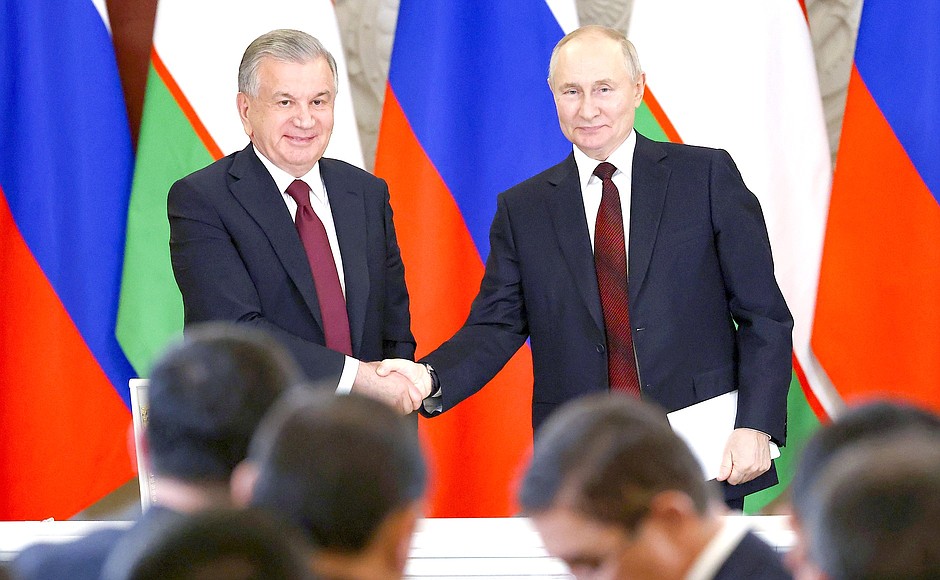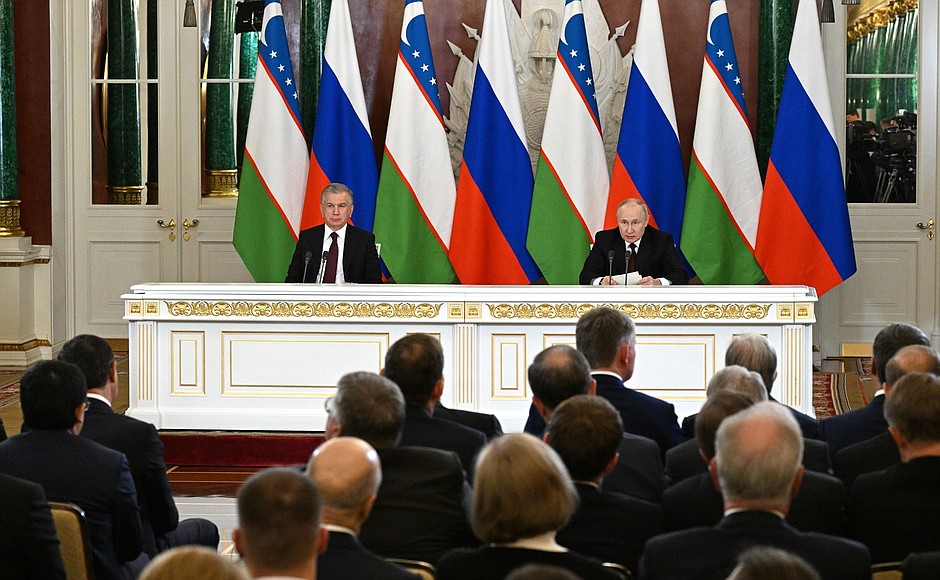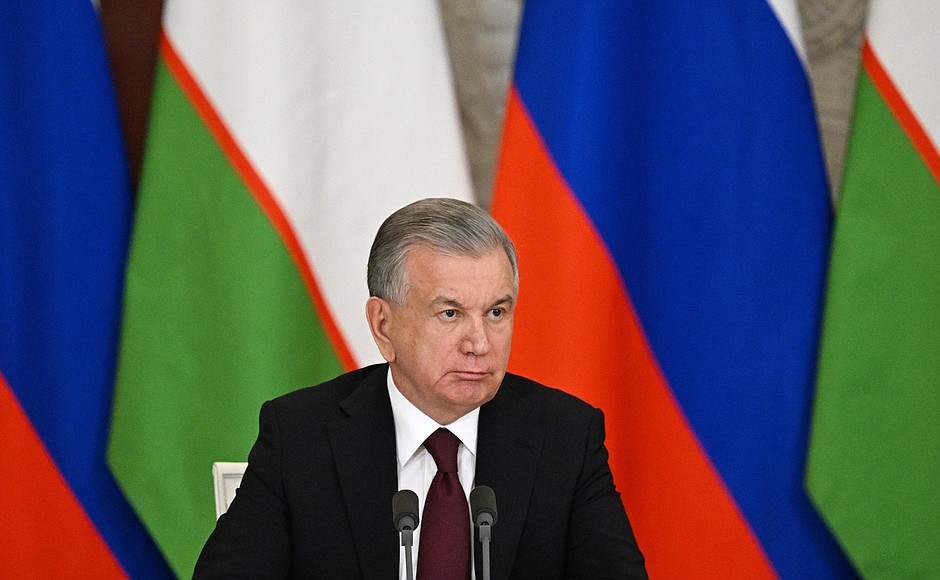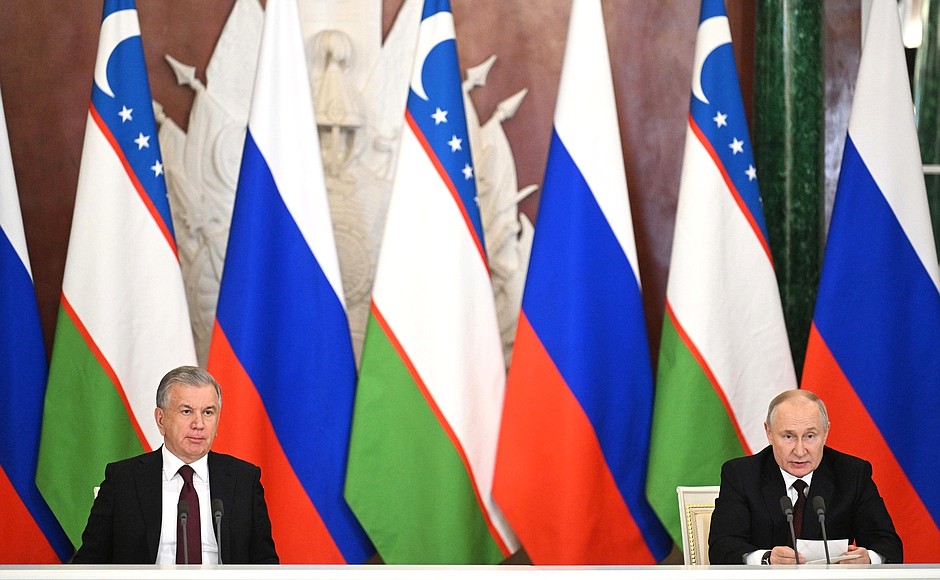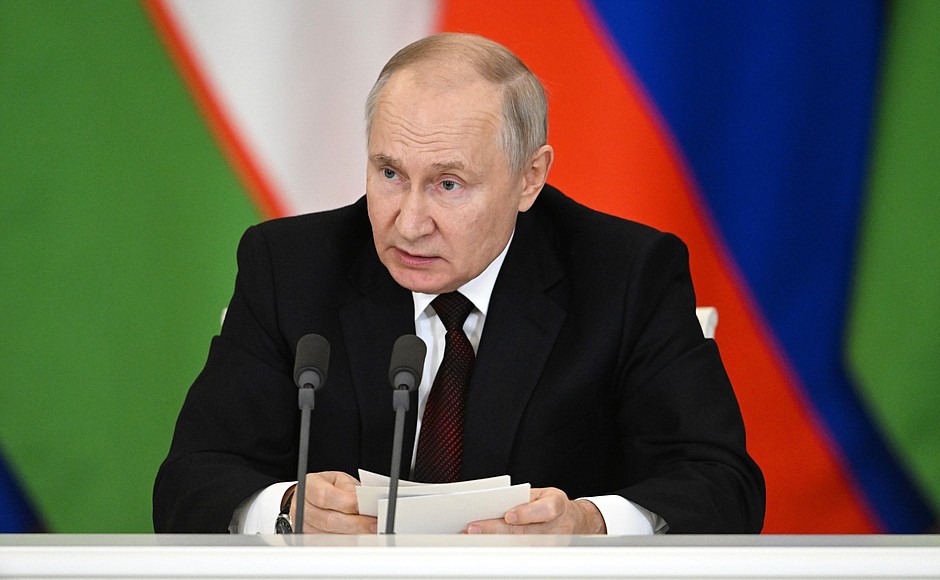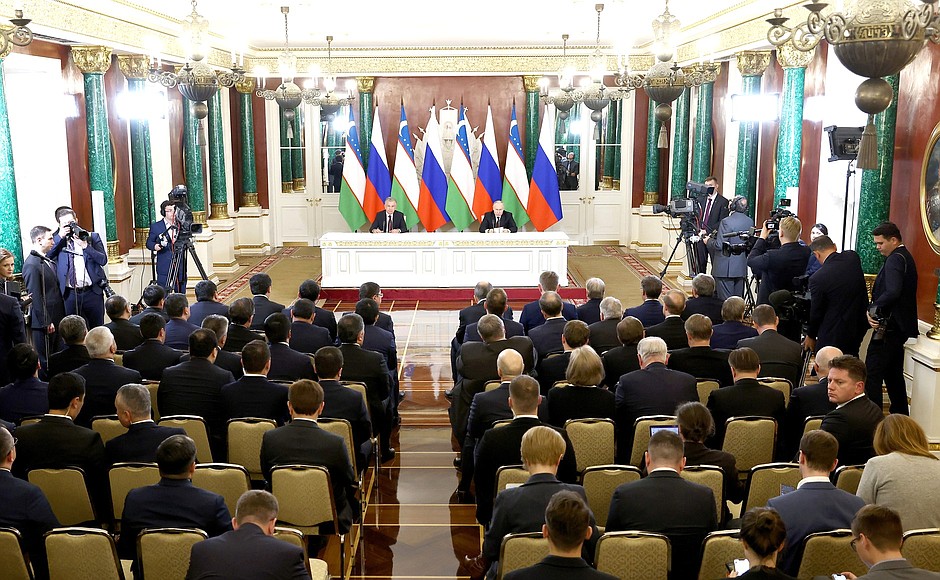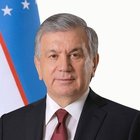President of Russia Vladimir Putin: Mr President!
Friends, ladies and gentlemen.
The President of the Republic of Uzbekistan’s official visit to the Russian Federation is taking place in a friendly and business-like atmosphere, which fully corresponds to the nature of the comprehensive strategic partnership and alliance between our countries.
See also
The visit began yesterday with the President of Uzbekistan’s visit to Tatarstan, where he had the opportunity to review the socioeconomic achievements in that region. Today, we held substantive and, I would say, productive talks. My colleague agrees with this assessment. First, we met in the limited format, and then we had a meeting with the deputy prime ministers, ministers, and our other colleagues who are directly involved in cooperation across various sectors.
The Joint Statement on deepening the strategic partnership between Russia and Uzbekistan is designed to boost our joint political, trade and investment, cultural and humanitarian activities, as well as our security cooperation, including biological and cyber security. A package of documents and contracts has been signed by a number of government agencies and companies from the two countries.
Economic cooperation was discussed in detail during the talks, and both sides demonstrated a willingness to further deepen and diversify it.
Notably, Russia and Uzbekistan are consistently increasing mutual trade every year. Last year, trade grew by more than a quarter. Russia is Uzbekistan’s largest trading partner. Import-export figures increased by almost 15 percent in the first seven months of this year.
We noted that there is much more potential to tap into. If we stick to our plans – which is exactly what we intend to do – this growth will be much more significant.
Our country is also the leading investor in Uzbekistan’s economy. More than 3,000 companies with Russian capital are operating in Uzbekistan. In all, Russian investment there has exceeded $13 billion. Approximately 100 joint economic projects with a total value of $28 billion are being studied or are in the early stages of implementation.
Russia and Uzbekistan are making a transition to national currencies in their financial transactions and establishing sustainable channels for cooperation in the lending and banking business. For example, the share of the ruble in bilateral commercial transactions reached 47.5 percent last year and continues to grow. By now, 17 banks in Uzbekistan have joined the Bank of Russia’s financial messaging system.
The joint commission at the heads of government level deals with these and other economic matters, in line with the instruction issued by both presidents. It met for the fourth time in Moscow in mid-September. The intergovernmental commission on economic cooperation led by the deputy prime ministers of both countries addresses these matters as well.
The republic has held observer status with the EAEU for several years now, and we are confident that this status promotes our economic collaboration as well.
Energy cooperation is a key negotiating point. Notably, tomorrow, President of Uzbekistan Shavkat Mirziyoyev, President of Kazakhstan Kassym-Jomart Tokayev, and I will participate in a formal ceremony marking the beginning of Russian gas exports to Uzbekistan by Gazprom.
This is a historic event as it marks the first time in the entire history of these transport systems that Russian-produced gas will be directed from Russia to Central Asia. We reached agreement with President Mirziyoyev several months ago in an impressively short time. Uzbekistan, Russia, and Kazakhstan have joined efforts to create the necessary conditions for these exports.
The gas will transit through Kazakhstan to Uzbekistan, with a portion of the gas going to Kazakhstan. This important and mutually beneficial project is designed to ensure energy security for Uzbekistan and Kazakhstan, and the broader Central Asian region as well.
Many other major energy companies have been operating effectively in the Uzbek market for a long time now. For instance, Lukoil is developing the Kandym and Gissar gas fields and has built a gas processing plant in the Bukhara region. Tatneft and Zarubezhneft are involved in petrochemical processing, fuel supply, technological modernisation, and the enhancement of oilfield productivity.
We see favourable prospects for further collaboration in the fields of hydropower and the peaceful use of nuclear energy.
Bilateral industrial cooperation was extensively discussed during the talks. President Mirziyoyev discussed this separately, and I believe his focus is well-placed. The Russian side is supportive of these proposals which are extremely important for future development, especially in high-tech areas.
Other issues were addressed during the talks as well. With Russia’s support, the Tashkent Metallurgical Plant, with an annual capacity of 500,000 tonnes of rolled product, an auto assembly plant to build Russian vehicles such as Lada and KamAZ, and industrial technology parks in the Tashkent and Jizzakh regions have been built. The possibility of launching the Atom electric car, which was fully designed and developed in Russia, is being explored.
Cooperation between Russia and Uzbekistan in transport and logistics is expanding. Freight and passenger traffic has been expanding steadily, by orders of magnitude in certain areas.
Russia and Uzbekistan are currently working out a comprehensive programme of cooperation for the development of railway transport and infrastructure in Uzbekistan. This includes new Russian rail equipment and, which is very important for our Uzbek friends, establishing local production facilities in Uzbekistan.
In this regard, great prospects are opening up for the development of the North-South international transport corridor as well as other routes from Russia and even from Belarus to the Indian Ocean coast; one of the lines runs through Uzbekistan.
When discussing cooperation in the cultural and humanitarian sphere, we gave priority attention to education.
We noted that the “Class!” joint project is being implemented successfully. This is a joint initiative aimed at improving the quality of teaching Russian as well as general education subjects in the Russian language in Uzbekistan.
It includes dispatching Russian teachers to schools in Uzbekistan as well as professional development courses for Uzbekistani teachers. By the way, this initiative was proposed by the President of Uzbekistan.
The Russian side also stressed its interest in continuing to provide ample opportunities for young people from Uzbekistan to receive a higher education in Russia. Currently, 63,000 Uzbek students are studying at Russian universities, including about 14,000 under Russian Government grants. As many as 14 Russian universities have branches in Uzbekistan.
We are grateful to the Uzbekistani leadership for supporting the Russian Seasons international project in the republic this year. This cultural initiative includes numerous workshops and art exhibitions, film shows and theatre productions.
Our discussion of issues on the regional and global agendas has confirmed that Russia and Uzbekistan share approaches to most of them, or have similar views, as the diplomats say.
Our countries are coordinating their efforts at key multilateral platforms including the UN, and unfailingly maintain close cooperation at the CIS and the SCO.
In conclusion, I would like to express my gratitude to President of Uzbekistan Shavkat Mirziyoyev for our productive joint work. I know that he personally puts a lot of effort into deepening and expanding our cooperation. I am confident that today’s talks will serve to further strengthen our comprehensive strategic partnership across the board for the benefit of our peoples and countries.
And of course, I would like to thank all our colleagues, both from Uzbekistan and from Russia. We discussed this right before entering this room: you have done a great job, colleagues, thank you for this. I am sure that we will all see the result of our joint work soon.
Thank you.
President of the Republic of Uzbekistan Shavkat Mirziyoyev: Mr President,
ladies and gentlemen,
First of all, let me express my gratitude to President of the Russian Federation Vladimir Putin for inviting me to visit the Russian Federation on an official visit and for the traditionally warm and cordial welcome.
As President Putin already said, our talks today were held in an open, friendly, productive and businesslike atmosphere, as always. We discussed many issues, both in the restricted and expanded formats, in a productive and trust-based manner; we talked about everything. I am very satisfied with these talks.
We discussed in detail the entire range of issues in Uzbek-Russian relations of comprehensive strategic partnership and alliance. We outlined specific plans and defined the main goals for promoting bilateral cooperation. We exchanged views on current issues on the regional and international agendas. We were very satisfied to note the positive dynamics and progress achieved in all areas of our multifaceted interaction. We reaffirmed our commitment to further develop our long-term mutually beneficial relations.
Particular attention was paid to building up trade, economic and investment cooperation, which has shown stable positive dynamics in recent years.
We highlighted an increase in mutual trade. I would like to emphasise that today, industrial goods and products with high added value account for 70 percent of our exports and imports. This is a new and positive trend. The past two or three years of our intensive joint efforts with President Putin have yielded these impressive results.
We agreed to take effective measures to further increase mutual trade and continue our joint work on augmenting the share of mutual transactions in our national currencies. We will establish a permanent expert group for analysing and identifying new possibilities in expanding trade.
We looked specifically into qualitative changes in investment cooperation. The existing favourable conditions made it possible for us to diversify and expand our project portfolio, which encompasses major engineering, energy, petrochemical, metallurgy, textile, food, and many other projects.
Furthermore, we prioritise innovative projects that involve advanced technology and equipment manufactured by leading Russian companies and enterprises. We have agreed to provide comprehensive support for such projects and to facilitate cooperation between our countries, including through regular meetings of the ministers of the economy of Uzbekistan and Russia.
As President Putin noted earlier, we will launch another strategic energy project tomorrow to bring Russian natural gas to Uzbekistan via Kazakhstan.
We have also agreed to keep working to upgrade the energy infrastructure and to expand mutually beneficial cooperation in the oil and gas industry.
We very much appreciate the productive outcomes of the recent Forum of Regions of Uzbekistan and Russia that was held in Kazan. President Putin mentioned that I was in Kazan on the first day of my visit. I saw the potential and capacity for region to region cooperation. Our colleagues from the regions support each other and realise that there are great prospects for advancing cooperation.
Following this forum, agreements and contracts were signed by our regions for mutual supplies of agricultural and industrial products, the implementation of promising projects in the manufacturing industries, the agricultural sector, transport and logistics, tourism, medicine, and more.
To promote the dialogue between the regions, we have decided to draft a roadmap with specific events and schedules for mutual visits. We have agreed to adopt a separate schedule for annual visits to the regions. We agreed to do this during the meeting with the representatives of two regional governments yesterday, and it will be an ongoing and systematic effort.
During the talks, we specifically focused on the issue of firmer social guarantees for our citizens working in Russia. We agreed on expediting the preparation of an agreement to this effect.
We noted the importance of expanding our humanitarian exchanges, implementing partnership programmes in science, innovation, education, culture, medicine, sports and tourism.
I would like to make a special note and express my gratitude: this year, an Uzbekistan National Ballet production premiered at the Bolshoi Theatre in Moscow for the first time with great success. Days of culture, cinema and other cultural events were also held in Russia.
The renovated Uzbekistan pavilion recently reopened at the National Exhibition Centre (VDNKh). I would like to take this opportunity to recommend that everyone here, journalists and everyone else in our meeting, visit this unique piece of architecture, which has reopened its doors for citizens of Uzbekistan and Russia.
In turn, the people of Uzbekistan very much appreciate the cultural events that take place in our country as part of the Russian Seasons project. During the talks, we agreed to organise the mutual Days of Culture, Art and Literature in the two countries in the coming years.
Russia and Uzbekistan are also expanding education cooperation. As of today, there are 15 branches of Russian universities in Uzbekistan. I think this is a lot. We will continue our cooperation on this track.
As has already been said, more than 60,000 young people from Uzbekistan are studying at Russian universities. The recent forum of university rectors from Uzbekistan and Russia once again confirmed the high mutual interest in building up cooperation in educating professionals and in scientific and academic exchanges.
In addition, we highly commend the practical results of the First Medical Forum that took place shortly before this visit.
Ladies and gentlemen!
We continue to focus on countering conventional and new challenges and threats, primarily terrorism, extremism, organised crime and drug trafficking. We agreed to deepen close cooperation between the competent authorities and special services of Uzbekistan and Russia in this area.
Our foreign ministries will continue consultations on the bilateral agenda as well as at international organisations.
We have also encouraged more intensive inter-parliamentary ties, noting their important role in promoting trade, economic and humanitarian projects of cooperation between our countries.
Ladies and gentlemen!
Following today’s productive talks, we released a Joint Statement on deepening the comprehensive strategic partnership and allied relations between Uzbekistan and Russia. In addition, we attended the signing of the package of important documents in the political, economic, energy, transport and education areas. You were witnesses to this yourselves.
The implementation of today’s agreements and the decisions we have taken are entrusted to the existing effective mechanisms of cooperation, the joint commission at the heads of government level and the bilateral intergovernmental commission.
Today, for the first time, we agreed with President Putin that we would adopt a roadmap on everything that we agreed on in both the restricted and expanded formats, and that we would both sign it and take it under strict control, because we discussed very serious issues. There is a foundation, and there are good prospects. When there is tough control, I believe there will be tangible results.
In conclusion, I would like to inform you that I have invited President Putin to pay an official visit to Uzbekistan at any convenient time.
I am confident that today’s talks will contribute to further strengthening Uzbekistani-Russian relations of friendship, strategic partnership and alliance, and to expanding the multifaceted cooperation between our countries.
For my part, I would also like to thank both our Russian partners and the members of the Uzbek delegation. We have worked very hard and productively, and were properly prepared. Today, in fact, we have a good result for our success moving forward. I am grateful to all of you.
Mr President, thank you once again for such a warm welcome, for our thorough discussion of the pressing issues that are on the agenda.
I believe that we have no more unresolved issues. We have agreed that we will maintain contact, continue our dialogue, and our colleagues will work on all issues, including the most difficult ones.
Thank you for your attention.
